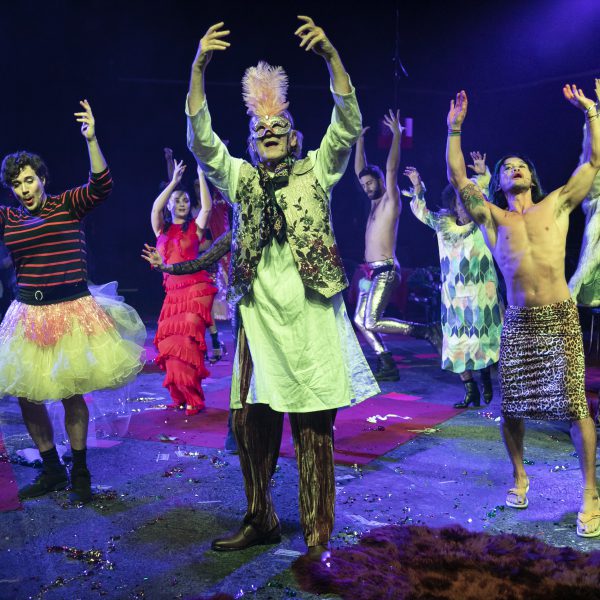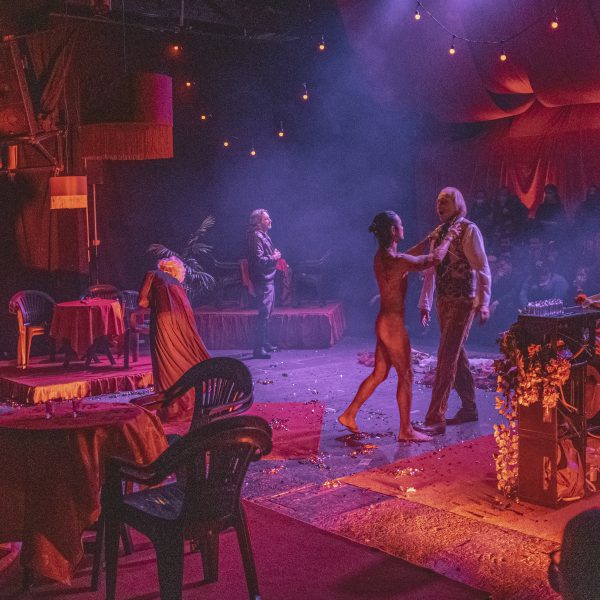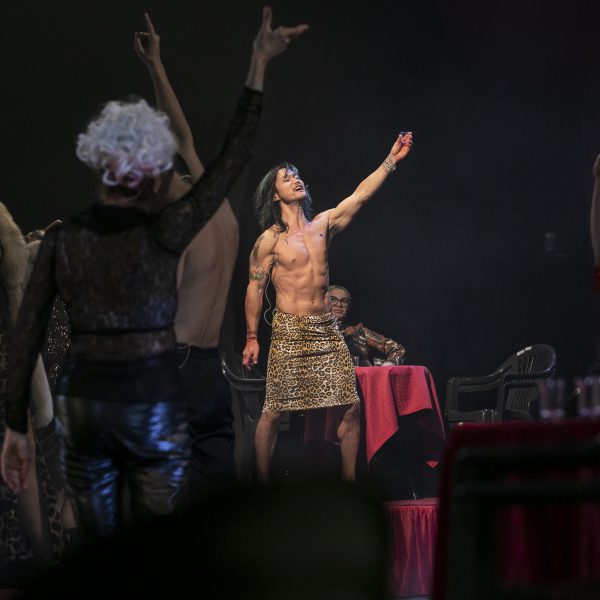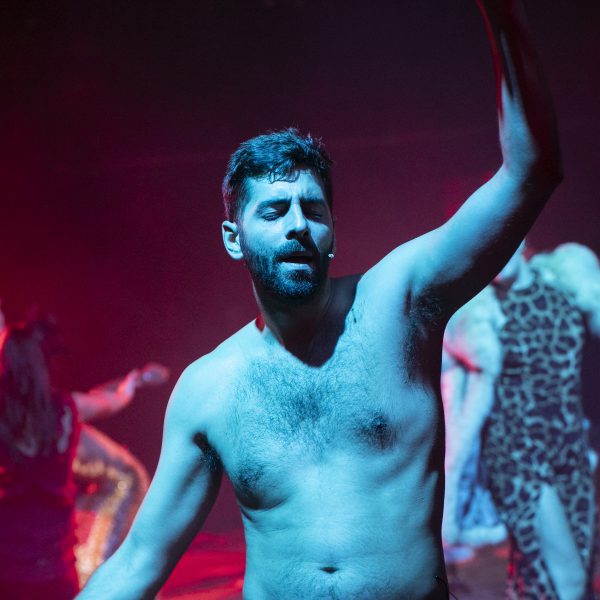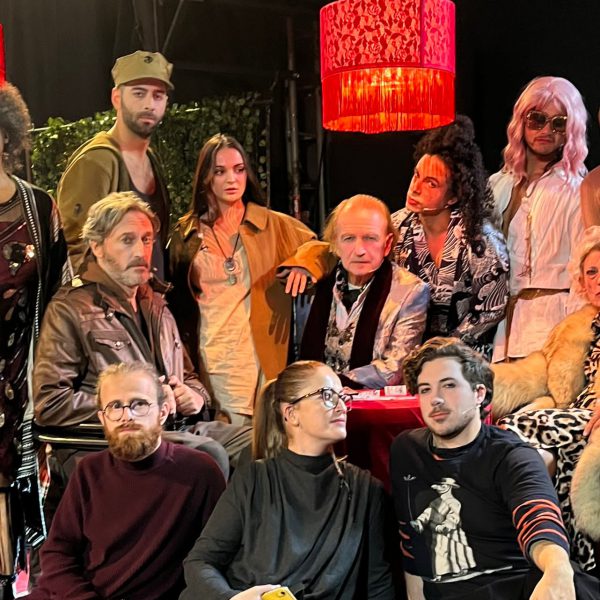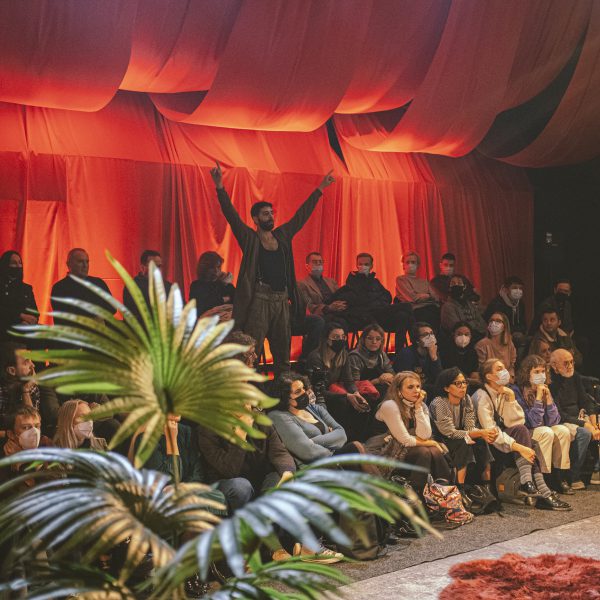Balkan Bordello

La MaMa Theatre, New York
in association with
Qendra Multimedia, Prishtina, Theater Atelje 212, Belgrade and My Balkans, New York
A trans-Atlantic theatrical project between USA, Kosovo and Serbia
With artists and creators from USA, Kosovo, Serbia, Italy, The Netherland, Albania and Switzerland
Performed in English language
by: Jeton Neziraj
Directed by: Blerta Neziraj
With: Onni Johnson, Svetozar Cvetković, George Drance, Eugene the Poogene, Valois Mickens, John Maria Gutierrez, Mattie Barber-Bockelman, Ivan Mihailović, Matt Nasser, Verona Koxha
Composer: Gabriele Marangoni
Costumes: Gabriel Berry
Stage design: Marija Kalabić
Choreographer: Gjergj Prevazi
Visual and light concept: Nico de Rooij
Dramaturges: Dimitrije Kokanov, Zishan Ugurlu
Producer of the Balkan Bordello: Beka Vučo
Production coordinator: Maud Dinand
Lighting: Yann Perregaux
Ass. director: Gëzim Hasani
Translator: Alexandra Channer
Production manager: Kushtrim Sheremeti
Technical support: Mentor Berisha
Sound design: Damiano Meacci / Tempo Reale
Ass. costume designer: Flaka Rrustemi
Video: Ilir Gjocaj
Press clips:
“Exciting, provocative and painful…” – Danas, Serbia
“One theater performance has arouses great interest in the entire Balkans. It is about the wars in the former Yugoslavia, but relies on Greek tragedies and carries a universal anti-war message.” – Deutsche Welle
“The theatrical language is as allegorical as it is lyrical. The soldiers swagger, and the shedding of blood always warrants revenge.” – American Theatre, USA
“Neziraj draws on the figure constellation from Aeschylus ’” Oresty “trilogy. Instead of a royal palace, however, a battered-looking motel is the setting. This is where the war hero Agamemnon returns. This character, played by George Drance, an actor from the cooperating La Mama Theater from New York, can be a warlord of the Balkan Wars, but also an Iraq veteran in the U.S. Army or an Afghanistan veteran in the German Armed Forces.” – Taz, Germany
“The staging by Blerta Neziraj is carnivalesque and full of intentional mess; by the end the stage is carpeted with glitter, dollar bills, business cards and ribbons of toilet paper.” – Natasha Tripney for the www.seestage.org
“…imagine that bloodshed is happening everywhere around you, caused by unhealed traumas and unresolved conflicts of the just-finished war. Imagine that even in these morbid circumstances you’ll be drawn by turbofolk music to participate in orgiastic dances. Welcome to the world of Balkan Bordello. This flamboyantly dark anti-war show isn’t just rich in story and style, but also in the production’s prehistory.” – The Theatre Times
““Balkan Bordello… […] was a turbo charged mash-up of theatrical styles and cultures. Based on the Oresteia, Balkan Bordello reminded me of a quote from Che Guevara – “history finds us where we are born.” Which is to say, history finds us everywhere, if the history of violence and its perpetuation is universal as this play purports it to be -Kosovo’s problems, though particular, aren’t just peculiar to Kosovo, they are the problems of the whole world. The play also spoke to a Western society which is starting to face its murderous colonial past. It seemed an apt way to address authorship and artistic responsibility, particularly those of Western powers and countries.” – seestage.org
“»Balkan Bordello« tells the story of life in a post-war society based on the ancient »Orestie« trilogy. Originally the play was trimmed for Kosovar warlords who come home in the role of the battle leader Agamemnon and prove to be incapable of integrating into civil society. At the premiere in 2017, Neziraj therefore received death threats from war veterans. The story has now been internationalized as part of a collaboration with La Mama Theater in New York and Atelje 212 in Belgrade. Agamemnon and Klytemnestra are played by US actors, the lover of Klytemnestra and a war companion of Agamemnons by actors from Serbia. Orestes, the son of Agamemnon, returns to the backward province as a cosmopolitan gay man. He is accompanied by a modern dance teacher who invites players and audience to his workshops and promises them to deal with trauma and personal development. His dance studio is a metaphor for the many so-called civilizing activities of the West” – Neues Deutschland, Germany
“Why don’t the moral categories arising from rote, traditional codes ever change? As long as man’s mind is in constant war with itself and the world, the cycles of violence will not be broken. This is why Blerta Neziraj directs the play like a nightmarish half-dream, a state of oblivion. This suggests that every individual has the option of breaking free of the spell of this cycle by making their own decisions. When a social norm penetrates deeply into biological functioning, a conflict arises and this conflict can be resolved through a change of norms or by violence, by war. This play asks us to think and make our own choices, to become aware of this possibility, and it tells us that power is the same as responsibility, and even under unbearable circumstances one can make difficult decisions and put a stop to violence.” – Vreme, Serbia
“«Balkan Bordello is bringing Serbian audiences a brilliant cast of New York actors, performing work by Kosovo’s foremost contemporary playwright, whose plays have been translated, published and directed in more than 15 languages. Neziraj has worked with major theaters such as the Volksbine in Berlin and La MaMa. Balkan Bordello is a play about the Agamemnons from Pristina, Belgrade, Podgorica, Tirana, […] New York, Tel Aviv… so is the play telling us that we need to recognize our own Agamemnons rather than projecting them as being outside of ourselves, onto others?” – Danas, Serbia
“Borrowing the setting from the Oresteia, play evokes an archetypal society which emerges from the war in a state of confusion, where the old order and power relations have been subverted, and the new does not seem to have any legitimacy because it is based on pure force” – Anna Di Lellio, Laertes Press
About ‘BALKAN BORDELLO’
Balkan Bordello: The Saga of a Balkan Family is based on Aeschylus’ trilogy The Oresteia. As an avatar of the modern world, Agamemnon returns triumphant from the battlefield, having reduced the enemy city to ashes. But the fever and enthusiasm that come from inglorious victories are blood animals—they feed and live on blood. When he returns home, death awaits powerful Agamemnon. He is killed by his wife, Clytemnestra, the oppressed woman who, by killing her husband, seeks to find freedom. Together with Egist, a hypocritical poet, Clytemnestra wants to start a new life, without fearing she will be raped and humiliated by her husband. But freedom cannot materialize in territories where violence once reigned for so long. Now that Agamemnon is gone, Clytemnestra takes on the role of the abuser — she becomes the missing Agamemnon — and the one who must suffer from her violence, oppression and intolerance is Elektra, her daughter. But the cycle of violence cannot be easily closed, because “any blood shed, evokes new blood,” as it is sung in the play. Therefore, as she once killed her husband, Clytemnestra must now be killed by her son, Orestes, who, together with his boyfriend, Pilad, a choreographer, returns from Berlin where he was living as a refugee.
This is the bedrock of this play, which, with black humor, touches on the very fabric of the Balkan temperament, traces the morbidity of the human soul and highlights the stupidity and naiveté of an era being built on the foundations of violence, intolerance and hatred. The characters surrender to fate and nearly unconsciously fall into the trap of discontent and destruction. It’s this vein of destruction that seduces as death seduces life. Balkan Bordello is a play about traumatized societies that eat themselves. It confronts us with war as a machinery of destruction where life and normalcy capitulate in the face of humans’ infidelities and evils.
Democracy cannot be taken for granted. The battle for it must be ongoing. Any fluctuation from this goal gives way to ghosts of war, abusers of power and autocrats who see the fate of the societies they rule as a game of Russian roulette. The same examples we had yesterday, we still have today. The bloodied Balkans of the 90s and the Balkans thirsting for revenge now. Contemporary Hungary led by autocrat Orbán, where civil liberties are stolen at every step. Post-Trump America, where deceived Americans continue to see wall-to-wall dreams. Turkey and Russia where people live in fear of state dictatorship. Germany, which continues to be haunted by the living ghosts of Nazism. Israeli soldiers flattening Palestinian cities. Hamas Palestinians firing rockets at Israeli cities. A Syria made flat… for God’s sake, do we even know by whom?
Balkan Bordello is an epic tale for the age of insanity we are currently living in.
About the author
Jeton Neziraj is the Director of Qendra Multimedia, after serving as the Artistic Director of the National Theatre of Kosovo. He has written over 20 plays that have been staged (over 50 productions), translated and published in more than 15 languages. His plays have won numerous prizes and have been performed in theatre festivals throughout Europe. “…The plays [of Jeton Neziraj] are raucous, irreverent and absurdist. They invoke Ibsen, Molière and Kafka…” The Guardian wrote about his work. The German theatre magazine Theater der Zeit and the German Radio Deutschlandfunk Kultur have described him as ‘Kafka of the Balkans’, while Los Angeles Times called him “a world- class playwright who challenges our complacency at every twist and turn”. He is winner of 2020 Europe Culture Award.
Balkan Bordello is an epic tale for the age of insanity we are currently living in.
About the Director
Blerta Neziraj has been directing plays in Kosovo and Internationally, and her productions toured extensively abroad (Vidy/Lausanne, Piccolo Theater/Milano, Volkstheater/Vienna. Volksbhune/Berlin…). She is a Lincoln Center Theatre Directors Lab alumnae (2018) and in Spring 2019, she recreated 55 Shades of Gay at La MaMa in New York. She is an award-winning theatre director (including “The best directing for 2020”, in Kosovo) and for her work she received great local and international reviews. The Guardian described her as “one of the country’s leading directors.”, while The Stage described her shows as “uncompromising… necessary… bold and powerful”.
La MaMa – New York, USA
La MaMa Experimental Theatre Club is dedicated to the artist and all aspects of the theatre. It is a creative home to artists and audiences from around the world, and a dynamic hub for risk-taking new performance. A vital part of New York City’s cultural fabric, La MaMa has a worldwide reputation for producing theatre, dance, music, and performance art that defies form and embraces all identities. Founded in 1961 by theatre legend Ellen Stewart, La MaMa is the only original Off-Off-Broadway venue still in operation. Ellen established La MaMa as a haven for underrepresented artists to experiment with new work, without the pressures of commercial success. Today, it maintains an environment of uncensored creative freedom, where artists of all backgrounds and identities can develop work that pushes the boundaries of what is possible onstage. To date, La MaMa has supported more than 5,000 productions, featuring 150,000 artists from 70 nations. In 2018, The American Theatre Wing presented La MaMa with the Regional Theatre Tony Award, recognizing us as “the influential company that helped give birth to the Off-Off-Broadway movement.” La MaMa has also been honored with more than 30 Obie Awards, and dozens of Drama Desk, Bessie, and Villager Awards. Its international network extends worldwide. La MaMa has presented the U.S. debuts of many artists, such as Min Soo Ahn, Peter Brook, Tan Dun, Cecile Guidote-Alvarez, Tadeusz Kantor, Branko Milicevic, Kazuo Ohno, Andrei Serban, Shuji Terayama, Tokyo Kids Brother, Duk-Hyung Yoo and Belarus Free Theatre. For more information on cooperation between Qendra Multimedia and La Mama, click HERE.
Qendra Multimedia, Prishtina, Kosovo
Qendra Multimedia is a cultural organization based in Prishtina, Kosovo. Since 2020 has its own theater (Oda Theater) with 200 seats, in the city center of Prishtina. Its main focus is in contemporary theater and literature. It is considered to be as one of the most interesting and provocative theatre companies in South Eastern Europe. Performances produced by Qendra Multimedia have shown to be provocative, stirring up debate with the public. Our performances has been touring all over Europe and in the USA. Qendra has co-produced work with various theater companies in Europe and in the USA, including, with Volksbühne Berlin, La MaMa New York, National Theater of Kosovo ect. Qendra’s work has been featured widely in the international press, including in The Guardian (UK), in the New York Times (USA), Der Spiegel (Germany), La Repubblica (Italy), The Stage (UK), Los Angeles Times Times (USA), Theater Heute (Germany), Danas (Serbia), Frankfurter Allgemeine Zeitung (Germany), American Theatre (USA), Der Standard (Austria), Linköping (Sweden), Hystrio (Italy), Cassandre (France) ect.
“There’s a tendency when writing about theatre to bandy about words like ‘necessary’ and ‘bold’, in a way that can dilute their meaning, but last week in Prishtina, the capital city of Kosovo, I saw work where no other words would do. A direct and uncompromising approach was taken by In Five Seasons: An Enemy of the People – the highlight of the showcase for me, also directed by Blerta Neziraj… It used Ibsen’s play as a frame within which to explore the rampant illegal construction work that took place in Prishtina in the aftermath of the war in the name of ‘reconstruction’. The scene of the Architect’s murder was powerfully staged. While her work often has a punky aesthetic, featuring striking tableaux, the waving of banners, and, in one previous production, a troupe of dancing condoms – the death scene was incredibly restrained, played out on the side of stage, it was a stark and quiet scene, the Architect’s life seeping from him in the dark… – The Stage, UK
Atelje 212, Belgrade – Serbia
The theatre “Atelje 212” was founded by a group of actors, directors and writers in 1956 as the theatre of new avant-garde drama. The appearance of Atelje 212 is a significant milestone in Belgrade’s theatrical life. The studio was established as a theater where a new avant-garde drama would be played, of great influence in Europe at that time. They want to create a theater that will be organizationally different from the existing ones. Atelje 212 is among the most visited theaters and most expensive in Belgrade. As of 2018, it has 34 permanent actors and actresses, and like in the past, actors from other Belgrade’s theaters come to play..
My Balkans, New York – Belgrade
The guiding purpose in forming My Balkans is to support and encourage people to build a better, more just, and open democratic society in the Balkans and South Eastern Europe using arts, culture, and education. My Balkans mission is multifold: to develop and fund projects, programs, and activities in the region; to raise social awareness; to build relationships and alliances with individuals and organizations; and to support societies committed to justice and equality. All this, in order to promote freedom of expression, social openness, artistic excellence and educational advancement. The arts, culture, and education are pillars of a democratic society that play an essential role in human development. Actions in the sphere of arts, culture and education help create safe spaces for free expression, exchanges, and mutual understanding and contribute to social equality, cohesion, innovation, and change. These pillars of democratic society can also be a powerful platform for tackling today’s key social challenges, due to their capacity to elicit powerful cognitive and emotional responses and to promote conflict prevention and resolution. Arts and culture can truly be transformative, sparking hope and imagination, and taking people on journeys of discovery and change. High quality artistic work can connect people in unexpected ways, building safe spaces for individuals to be themselves and to believe in a positive future, especially in times of conflict or post-conflict and different crises. My Balkans will employ various channels and innovative systems to encourage and expand philanthropy and charitable giving through identifying, coordinating, and streamlining the charitable processes while building a reliable infrastructure for the distribution of grants to places of need and/or in crisis
“Nightmare, Obliviousness”, Nataša Gvozdenović, Vreme, 18 November 2021
“Jeton Neziraj: Never has a single director from Kosovo been invited to direct a play at a theater in Serbia“, Radmila Radosavljević, Danas, 16 November 2021


